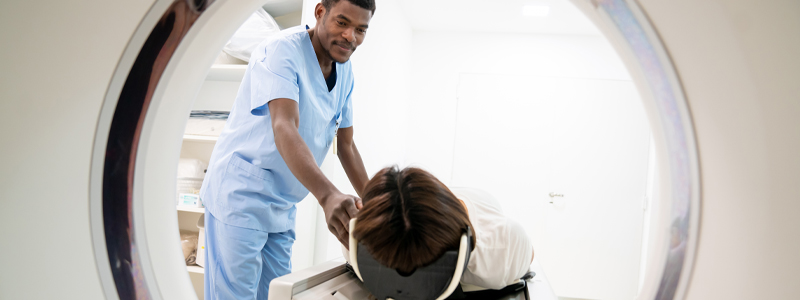When is magnetic resonance imaging (MRI) used?
MRI is used to diagnose a wide range of conditions. Your doctor might order an MRI scan to examine the brain, bones, breasts, joints, heart, or other internal organs. MRI is useful when the cause of symptoms is unknown and your doctor needs more detail about the inside of your body.
How does MRI work?
An MRI scanner uses strong magnets and radio waves to produce detailed images. Your body contains magnetic hydrogen atoms, which line up with the system’s magnetic field during an MRI scan. Then, a radio wave knocks the atoms down. The system measures the time it takes for your atoms to return to their initial position, and the computer processes this information to create images. One MRI scan produces many images. Combining images creates a 3D image.
What can I expect during an MRI scan?
You will lie on a bed, which will be moved inside the MRI scanner. Depending on the part of your body being scanned, you will enter with your head first or feet first. Sometimes, a frame is used to cover the body part scanned, and this helps produce a better image. The technologist will be with the MRI computer in a different room, but you will be able to talk to them throughout the test.
The test takes anywhere from 15 to 90 minutes. Electric currents in the scanner make loud tapping noises during the scan. Unless you have had a sedative, you will be able to resume normal activities right after your MRI scan. The radiologist will prepare a report to send to your doctor, who will discuss the results with you. Results are available via Epic MyChart. We are happy to assist you to access MyChart.
How should I prepare for an MRI scan?
Your doctor will give you specific instructions on how to prepare for your MRI scan. You should continue to eat normally and take all of your medications unless otherwise directed. It is recommended that you avoid caffeinated beverages. Wear comfortable clothes, and remove any metal objects such as jewelry, watches, glasses, and nail polish.
What are the risks associated with MRI?
MRI is a very safe and effective test. Metal interferes with the test, so you should discuss any possible metal concerns (pacemaker, metal plate, metal clips, insulin pump, tattoo, etc.) with your doctor. If you are in your first trimester of pregnancy, it is recommended that MRI scanning not be performed. A small percentage of people have an allergic reaction to the contrast agent, if used.
MRI at Radiology Associates of Hartford
Radiology Associates of Hartford offers MR Imaging to patients in Bloomfield, Glastonbury, and Enfield. If you are interested in MRI at RAH, please call us at 860-969-6400.
